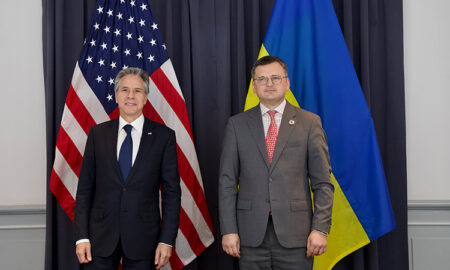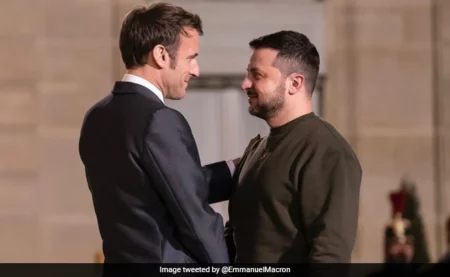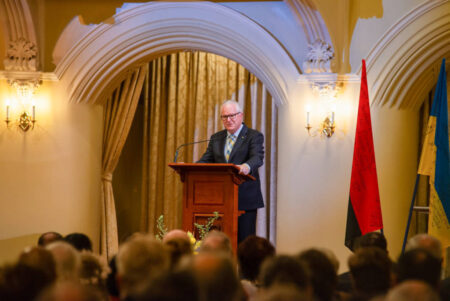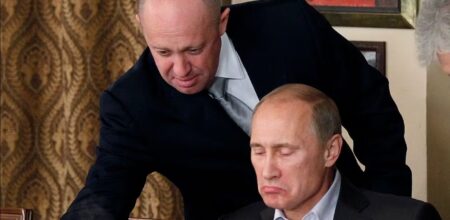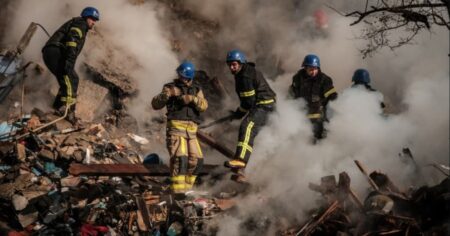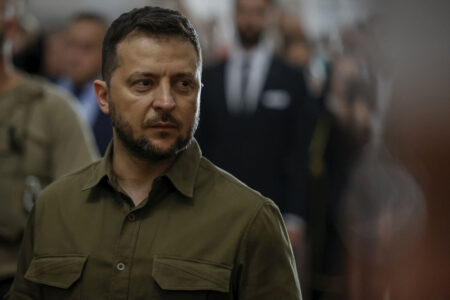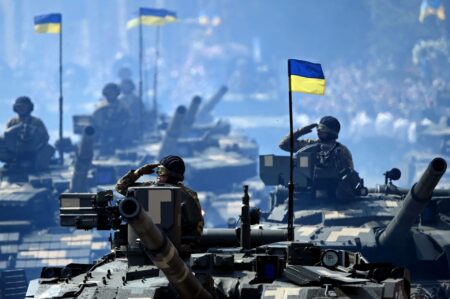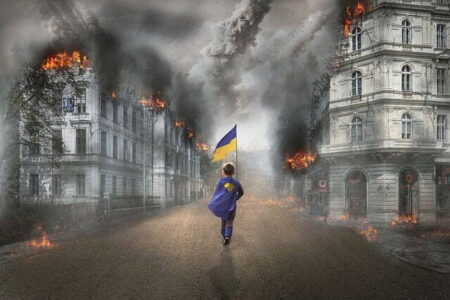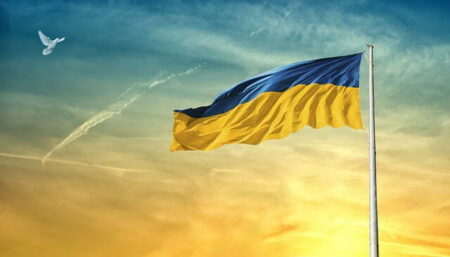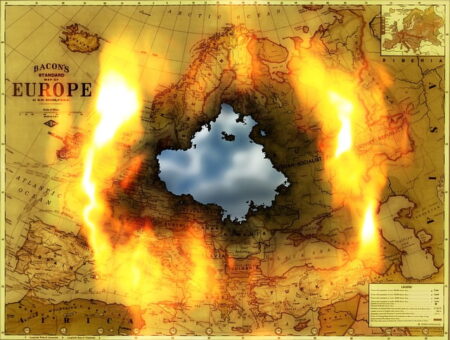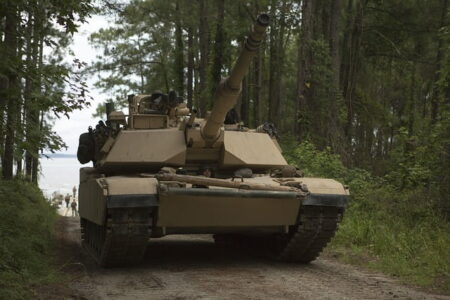Lithuanian Inheritance Corruption Scandal Leads to US Investigations.
Baltic states have embraced democracy and joined the European Union, but are still accused of condoning...
4 min read
Warren Buffett’s $150 Billion Bet: Four Stocks Reshaping Berkshire Hathaway’s Portfolio
Since assuming leadership of Berkshire Hathaway in 1965, Warren Buffett has achieved remarkable success,...
3 min read
Evaluating Tesla’s Recent Pullback: Is it Time to Buy?
Over the past week, Tesla (TSLA -4.23%) shares have seen a substantial decline of over 11%, influenced...
2 min read
Investing in Apple: Timing and Long-Term Prospects
Apple (AAPL 0.49%) has etched its mark as a powerhouse in the global consumer tech market, boasting an...
3 min read
Challenging Gendered Parenting Stereotypes: The Jonas-Turner Divorce
As news of musician Joe Jonas and actor Sophie Turner's divorce surfaced, so did the familiar media narrative:...
2 min read
Navigating the Realm of Road Ecology: Insights from Ben Goldfarb’s ‘Crossings’
Author Ben Goldfarb shares a profound exploration of road ecology in his latest book, "Crossings.
3 min read
Joint Press Availability: Antony J. Blinken and Ukrainian Foreign Minister Dmytro Kuleba
In a significant diplomatic exchange, Secretary Antony J. Blinken and Ukrainian Foreign Minister Dmytro...
2 min read
Google’s New Policy: Disclosure of AI-Generated Political Ads
In response to the escalating prevalence of tools generating synthetic content, Google is set to implement...
2 min read
Reshuffling in Spanish Women’s Soccer: Coach Jorge Vilda Dismissed Amid Unwanted World Cup Kiss Controversy
In a significant development in the realm of Spanish women's soccer, Jorge Vilda, the head coach of the...
2 min read
Reviving Adult Corals: A Groundbreaking Step Towards Conservation
In a groundbreaking development that reads like science fiction, scientists have achieved the cryopreservation...
4 min read
Zelensky and Macron Hold Talks on the “Operation of the Grain Corridor”
Ukrainian President Volodymyr Zelensky engaged in a conversation with his French counterpart, Emmanuel...
2 min read
A Glimpse into the Past: How X-Rays Revolutionized Brain Imaging 50 Years Ago
In the annals of medical history, a breakthrough occurred 50 years ago that forever altered the landscape...
3 min read
Rishi Sunak’s Bold Choice: Grant Shapps as Defence Secretary in Times of War
The appointment of Grant Shapps as the new Defence Secretary raises eyebrows and concerns as he steps...
3 min read
Japan-Ukraine Summit Telephone Conversation: Strengthening Bilateral Bonds
In a significant diplomatic interaction that transpired on August 29, Mr. KISHIDA Fumio, the esteemed...
3 min read
Unveiling the Secrets of Rotaviruses: The Impactful Journey of Mexican Virologist Susana López Charretón
Susana López Charretón, a prominent figure in Mexican virology, has left an indelible mark on the field.
4 min read
Unveiling the Enigmatic Figure: Dmitry Utkin and His Role in Wagner Group
In the intricate tapestry of global conflicts and clandestine operations, Dmitry Utkin emerges as a cryptic...
4 min read
Exploring the Potential of Weight Loss Drugs in Battling Addiction
The advent of weight loss drugs, particularly GLP-1 analogs, has taken the medical world by storm.
5 min read
Celebrating Ukrainian Independence: A Melodic Soiree at the Ballroom
In a resounding ode to the spirit of Ukrainian Independence Day, the Governor and Mrs. Dawson graced...
2 min read
Unveiling the Intricacies of Polyploid Cells: A Key to Stress Response and Evolutionary Survival
Diving into the intricacies of cellular biology often uncovers unexpected phenomena that reshape our...
6 min read
US Fighter Jets Intercept Aircraft Violating Airspace Near President Biden’s Lake Tahoe Vacation Spot
Discover the recent occurrence involving US military fighter jets intercepting a civilian aircraft that...
3 min read
Putin Extends Condolences After Plane Crash, Speculations Surround Prigozhin’s Fate, and BRICS Coalition Expands
A somber cloud envelops Russia as reports emerge of a tragic plane crash, believed to have claimed the...
3 min read
India’s Successful Lunar Landing: A Triumph Amid Recent Setbacks
"Space is hard," a phrase that encapsulates the formidable challenges faced by humans and their machines...
3 min read
Russia Thwarts Ukrainian Drone Attacks, Disrupts Moscow Flights
Russia reported that it successfully thwarted two Ukrainian drone attacks in the Moscow region, preventing...
3 min read
Strategic Insights Unveiled: DeSantis Allies Lay Out Debate Plan
A treasure trove of candid advice, confidential memos, and internal polling has been thrust into the...
4 min read
Decoding Pink Floyd: Unraveling Music through Brain Activity
In a narrative that seems plucked from the pages of science fiction, a mesmerizing feat has emerged from...
5 min read
Invest in Your Culinary Dream: Insights from Bobby Flay on Restaurant Success
Embarking on the journey of opening a restaurant is no small feat, and who better to glean wisdom from...
4 min read
Chegg’s Innovative Approach: Easing Student Loan Debt for Employees
As the burden of student loan debt continues to weigh heavily on individuals, companies like Chegg are...
4 min read
Harnessing the Power of PR: Elevating Your Personal Brand
In today's digital landscape, establishing a robust personal brand is crucial for professionals across...
3 min read
Unpacking the Recent Downturn in Nikola Stock Amidst Anticipation of Hydrogen Truck Launch
Nikola, on the cusp of unveiling its groundbreaking hydrogen-powered trucks, encountered a significant...
3 min read
Navigating Healthcare Investment: 2 Top Stocks to Consider Now
In the realm of dividend investing, strategic selection of stocks within evergreen industries can be...
4 min read
Ukraine’s Struggle for Momentum: Implications for Zelensky and US Politics
Amid a critical offensive that has fallen short of expectations, Ukraine faces a complex predicament...
4 min read
Unraveling the Cosmic Puzzle: Electrons’ Perfect Roundness and the Enigma of Matter-Antimatter Asymmetry
In a groundbreaking discovery, physicists have achieved an unprecedented level of precision in measuring...
4 min read
Fiverr Stock Soars 20%: Impressive Q2 Results Propel Growth Prospects
Fiverr International, the freelance services marketplace, experienced a significant upswing in its stock...
3 min read
Unlocking the Enigmatic Role of the Thymus in Adult Health
The thymus, a mysterious organ that reaches its peak during childhood, has long been perceived as less...
4 min read
Rivian Faces Turbulence as Competition Heats Up
Rivian Automotive has enjoyed a remarkable surge in stock value over the past three months, more than...
3 min read
Unveiling the Colossal Ancients: A Whale to Rival All Weight Records
In the realm of ancient wonders, a newly discovered fossilized giant takes center stage. With fossilized...
4 min read
Ukrainian Pilots Set to Begin F-16 Training Amidst Pending Approval and Ongoing Preparations
Ukrainian pilots are scheduled to commence training on F-16 fighter jets this month. The training program,...
3 min read
Reevaluating Oracle’s AI Stock Amidst Market Hype
The AI mania of 2023 has given database software veteran Oracle a significant boost in its stock price,...
3 min read
Starbucks vs. McDonald’s: Which Restaurant Stock is a Better Investment?
Investors currently hold different expectations for Starbucks (SBUX -2.29%) and McDonald's (MCD -0.
3 min read
UK Economic Woes: Government and Central Bank Clash over Inflation
The United Kingdom finds itself at the center of an economic struggle as inflation rates remain stubbornly...
3 min read
The Turning Points of the Ukraine-Russia Conflict: Implications for the Future
The ongoing conflict in Ukraine has been marked by a series of events that have led to the escalation...
4 min read
Ukraine’s Strategic Advantage: Developing a Near-Space Airship Program with Lessons from China and Support from the US to Defend Against Russian Aggression
Since the annexation of Crimea in 2014, Ukraine has been in a state of war with Russia. In recent years,...
3 min read
China’s People’s Liberation Army Explores Near-Space Vehicles as Omnipotent Weapons
China's People's Liberation Army (PLA) is exploring the potential of near-space vehicles, including airships,...
6 min read
Top Largest Universities and Colleges in the US Offering the Best AI Majors – Including Miami Dade College with 153,000+ Students
The demand for professionals with expertise in Artificial Intelligence (AI) has significantly increased...
6 min read
Yuri Vanetik: We Must Call for Stronger Action from the West and NATO as Putin Defiantly Vows to Protect Russia’s Interests
In light of these developments, it is important for Western nations to carefully consider their actions...
5 min read
The Changing Face of Russian Lobbying in the US: A Reshaped Strategy Amid Tensions and Conflicts
Russia’s ability to run effective information campaigns has been reinforced by its involvement in the...
5 min read
Epic transfer of wealth for Middle East – The Embargo on Russian Petroleum Products to EU: Huge win for Saudi Aramco
On February 5, 2023, the European Union imposed an embargo on the maritime supply of petroleum products...
4 min read
The Impact of the Russian Federation Oil Embargo on Europe and the US
The recent oil embargo imposed on Russia by the European Union has sparked discussions about its potential...
2 min read
The Adversarial Path: Examining the Allocation of Tanks to Ukraine and the Possibility of American Influence on European Decisiveness
The allocation of tanks to Ukraine has been a contentious issue in Europe, with its own set of challenges...
4 min read
NATO Secretary General: Explosion in Poland probably the result of Ukrainian anti-aircraft fire
NATO Secretary General Jens Stoltenberg said on Wednesday that a deadly explosion in Poland was probably...
2 min read
US considers sending older weapons to Ukraine
Why did Ukraine become a battlefield?The current situation in Ukraine began with the Euromaidan protests...
4 min read







